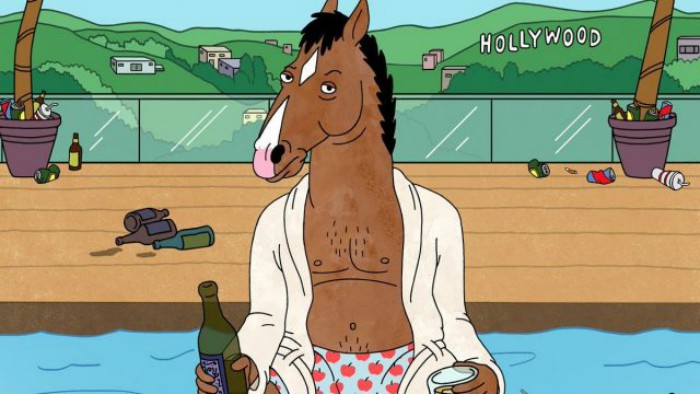The saddest satire of celebrity culture currently available on streaming platforms, Bojack Horseman returned to Netflix with its newest season last month. Known for its unique take on celebrity culture and unromanticized portrayal of mental illness, the animated show follows alcoholic horse-man Bojack Horseman (Will Arnett), the aged star of a ‘90s sitcom, and his life in anthropomorphic Los Angeles.
Bojack Horseman continues to employ cartoonist Lisa Hanawalt’s designs in its signature style: Visual jokes and animal puns add another clever layer to the show. The show has a reputation for unusual settings—consider the awards show episode in season three that took place completely under water—but in this season, the settings became even more abstract. The visuals compellingly depict flashbacks to the ‘20s, as well as inner monologues and hallucinations when the script demanded them, making for complex visual storytelling.
In characteristically witty and absurdist form, the show takes a darker turn in season four. While the first three seasons had their brutally emotional moments, each episode maintained a fair balance between humour and bleakness. By contrast, each episode in season four is significantly more harrowing. This imbalance gives the viewer less time to process dramatic scenes, which made the show difficult to watch at times.
Season four very topically addresses the political scandals of this year. As Mr. Peanutbutter (Paul F. Tompkins) runs for the position of governor of California–a role he is decidedly under-qualified for–the nepotistic and performative aspects of modern politics become evident. His views on divisive subjects such as fracking are entirely dependent on circumstance. In ‘Hollywoo,’ admitting to your dislike of avocado can make you lose voter support. The show develops an allegory for Trump’s rise to power, echoing the pettiness of many recent political scandals. Bojack Horseman shows how garnering support in politics unfortunately has less to do with merit and more to do with knowing the right people.
This most recent installment of the melancholic, alcoholic horse’s saga raises the stakes in terms of character development. Individuals once sequestered to mere secondary status are devoted full episodes, emotionally investing viewers in unexpected storylines. The episode “Hooray! Todd Episode!” follows Todd (Aaron Paul)—Bojack’s human best friend and primary enabler—as he questions his sexuality and interacts with other main characters. This focused perspective helps the story progress through multiple character plots at once, but also brings novel insight into the characters’ inner worlds.
Plotlines in creator Raphael Bob-Waksberg’s universe do not parallel each other. Convoluted, clashing arcs forego the convenience of simple storytelling. For instance, as the season draws to a close, Bojack’s manager and cat Princess Carolyn is determined to accomplish a personal goal which requires Bojack’s involvement. But our perpetually self-defeating hero harshly dismisses her pleas, bringing Princess Carolyn’s story to a frustrating anticlimax. Upon once again switching perspectives, however, we learn that Bojack had just made a harrowing discovery about his family. Bojack’s subsequent horror causes us to re-evaluate our original judgement of his knee-jerk response to Princess Carolyn, entering the particular episode’s climax into a heartbreaking, morally perplexing territory. As jarring as it is when arcs clash, Bojack Horseman shows that every individual story is more complicated than you'd think. Although not exactly an uplifting, moralistic lesson, the show posits—in its signature hungover haze—that there is always a life more miserable than yours right around the corner.
Although the heavier subject material was a little hard to stomach, the multiple perspectives, along with the amusing and relevant commentary on politics and show business, ensure that Bojack Horseman will maintains its entirely unique status among 21st century comedies.
https://www.youtube.com/watch?v=Bf12qwPWDVI









